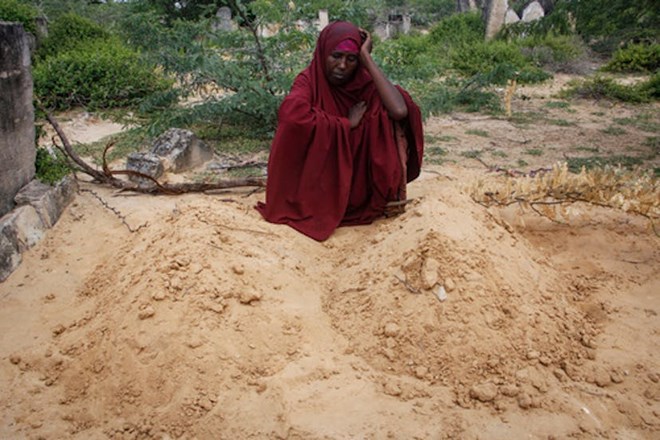
Sunday September 25, 2022
By Alex Chhith
"The importance of our Somali family around the world cannot be overstated," special presidential envoy Abdirahman Abdishakur said in a statement.

Fatuma Abdi Aliyow sits by the graves of her two sons who died of malnutrition-related diseases last week, at a camp for the displaced on the outskirts of Mogadishu, Somalia, Sept. 3, 2022. Millions of people in the Horn of Africa region. FARAH ABDI WARSAMEH, ASSOCIATED PRESS
Special presidential envoy Abdirahman Abdishakur visited Minnesota to raise funds for people in Somalia suffering from starvation due to drought.
Abdishakur spent time connecting with members of "The Star of the North's" Somali community to update them on the country's situation. He believes this year's drought is longer and more severe than the 201 1 drought which killed 260,000 people, and said things could get worse as the effects of climate change grow.
"Climate change is devastating to all of Africa. In Somalia and our neighboring countries, we are enduring the third drought in just over 10 years," Abdishakur said, adding that the region expects its upcoming rain season to fail for the fifth time. "The need of vulnerable people across the country are escalating fast. I really fear for what is coming to [worsen]."
Adequate support and funding could prevent famine from spreading across the country, but much might be needed. The United States has contributed over $870 million — more than half of all humanitarian funding received by Somalia in 2022, according a statement from Abdishakur.
"The importance of our Somali family around the world cannot be overstated," he said in the statement. "They were critical to averting famine in 2017."
The situation is further exasperated by climate change and ongoing fighting. Earlier this month, al-Shabab killed at least 20 people and burned seven vehicles transporting food — a devastating blow to people struggling to survive during the country's drought. The extremist group also blew up wells for water, according to the Associated Press.
"It's a vicious cycle of starvation, displacement competition over scarce resources," said Mohamud Awil Mohamed, director of development and operations at the Minneapolis branch of the Humanitarian African Relief Organization.
"That's one thing I want our community in Minnesota to understand is that its happening across the globe. This is what the future looks like as a result of reciprocal droughts and climate change," he said. "These are the places that will see the effects of massive climate inequality first, even though they emit the least amount of carbon into the environment."
But many from Minnesota's large Somali community, made up of nearly 83,000 people, showed their support in a Sept. 23 fundraiser that Abdishakur attended. Abdishakur said they raised thousands of dollars at the event, adding that he was uplifted by the sense of community felt there. He hopes other people working to support the country feel the same.
"There's not only drought and conflict, Al-Shabab terrorism, extremism [and] violence in Somalia. There's also opportunity," Abdishakur said, adding that the nation's systems and community are growing. "Somalia is coming out of the ashes of conflict ... I'm 100% certain that the future is good for Somalia."